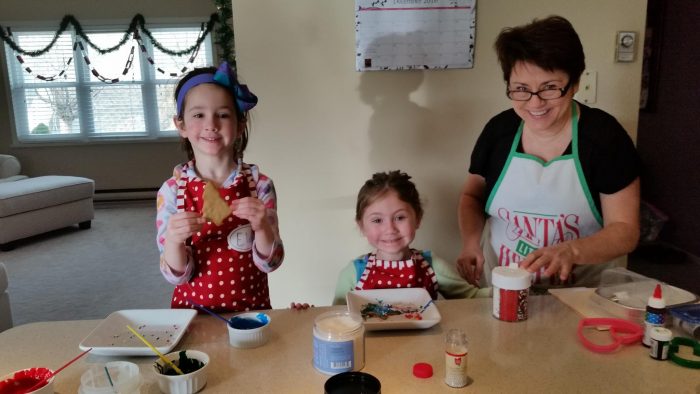My mother was the most selfless woman I know.
She always went out of her way to make every holiday, birthday, and life event special by baking elaborate, personalized cakes and hand selecting customized gifts for each person in our family.
Her smile was infectious. She was kind and sweet, even to snarky, demanding clients she spoke to on the phone at my mental health clinic where she worked as an administrative assistant.
She was so full of life and love…and then she was gone.
Thirty-six days was all we had from the day she was diagnosed with cervical cancer to the day she died.
I sat at her bedside around the clock for 12 of those days as she lay in a hospital bed on the palliative care unit, waiting to die. I held her hand, rubbed her feet, and brushed her hair. I watched her chest rise and fall, holding my breath in anticipation, knowing each exhale that left her lips could be the last one.
During those final days, my mom didn’t talk much, but when she did speak, it was with purpose to give me instructions on how to handle her finances when she was gone. She wanted to talk about passwords and where her files could be found, and I wanted to talk about all the wonderful memories we shared together over my 38 years of being her daughter.
She wanted me to know that her jewelry was to go to my two daughters and me. I wanted her to know how loved she was and how my girls’ lives just wouldn’t be the same without sleepovers, cupcake baking, and eating Italian Ice in the back of Nana’s car.
It wasn’t until weeks after she died that I understood why she spent that precious little time telling me about her finances and what to do with her assets. She didn’t have a will or any written document that indicated what her assets were or what to do with them.
As a financial therapist, my work is devoted to teaching women how to make more money, manage it strategically, and protect their finances. Realizing that my own mother hadn’t adequately tended to her finances made me feel like I’d failed her.
To ease my own guilt, I tried rationalizing by telling myself her death was sudden, unexpected, and there was no way to know before then that she needed legal documents to protect her assets and the family she left behind.
But when it came time to actually dealing with the aftermath of her death and tying up financial loose ends, I learned several surprising lessons about money that seemed like merely good ideas before and absolutely essential now.
Here are the six surprising lessons my mother’s sudden death taught me about money:
1. Always keep your finances organized.
One thing I give my mom credit for is her great organizational skills. Her records were impeccable and all her bank statements were separated into folders and labeled accordingly. Because she took the time to keep her finances organized, it was easy for me to see exactly what debts existed and how much money she had in each bank account.
Had she not been so meticulous, dealing with the trouble of searching for information and rummaging through her house in search of answers would have surely sent me over the edge. The heartbreak of losing my mother and best friend was hard enough, and I can’t imagine how much harder it would have been trying to untangle a financial mess.
2. Don’t wait to designate beneficiaries, a Power of Attorney, and the executor of your estate.
I was grateful that my mom designated me as the beneficiary of her life insurance policy and investments because it made it easy to complete the necessary paperwork and receive the funds, which were used for immediate funeral expenses. But she didn’t designate a Power of Attorney or Executor of her estate and that created many obstacles as I attempted to reconcile debts and close accounts.
In order for a family member to receive information and manage your finances after you’re gone, these legal documents must exist. Otherwise, they won’t have access to your assets or important information like debt payoff amounts, the value of your personal property, the authority to sell property or access accounts, or retrieve medical records.
3. Take out life insurance on your loans.
My mom made a smart move when she took out life insurance on her loans. She paid a little extra money each month for the insurance, but it saved our family thousands of dollars in the end because the debts were wiped clean when she died.
If you have the option of adding life insurance to your loans, do it for the sake of the people who will be responsible for paying off your debts when you’re no longer here.
4. Have a life insurance policy.
We all know healthcare in the United States sucks. So, I’m sure my mother wasn’t the only person who was medically underinsured. After being diagnosed, my mother was overwhelmed with worry about how we would pay for her medical care. Knowing that she had a substantial life insurance policy helped ease her mind and ours about how we’d ever dig our way out from under medical bills.
Even if you have great health insurance, a life insurance policy is a must-have. Your surviving relatives will lose your income and will be responsible for settling all of your debts, paying for funeral expenses, and any attorney fees involved in managing your estate. They’ll need that money. Make sure it’s there for them.
5. Create a will and keep it up to date.
I’m one of the lucky few who comes from a family that doesn’t argue over money or possessions. But if my family was like most (I’ve worked with financial therapy clients who had real family drama on their hands), my mother simply verbalizing instructions for who should get her belongings wouldn’t have gone over well.
When a loved one dies and there’s money or personal possessions to be had, family members can act like vultures circling around the deceased’s estate, eager to get their share. Spare your family the drama by creating a will that outlines what each person should inherit. This will also guarantee that your wishes will be carried out after you’re gone.
6. Enjoy your money while you can.
My mother was a hard worker who spent most of her career working two minimum wage jobs just to make ends meet. Yet, she managed to save a big chunk of change in IRAs. I teach my money therapy clients to invest well and save for their financial future, but seeing my mom’s life cut short at the age of 58 gave me a new perspective.
While I still firmly believe in saving and investing, I also believe that needs to be balanced with enjoying your money while you can. Indulge in the luxury item that feels like a guilty pleasure. Take the trip to Hawaii and make memories with your kids. Use your money to help others and leave a legacy of making the world a better place. I wish my mom had enjoyed her money more while she was alive to do so.
The uncomfortable truth is that we are all going to die. Each day brings us one step closer to the end of our existence on Earth. No one knows when their last day of life will be, which is why you need to prepare for it today.
If you’re alive today, which you obviously are because you’re reading this, take action right now and apply these six money lessons to your life. Don’t wait until you or a loved one is admitted to the hospital. Don’t wait for a convenient time to have tough money conversations or make important financial decisions that will protect you, your money, and your family.
When the overwhelming grief of losing someone you love deeply washes over you, the last thing you want to deal with is a financial mess. Be proactive and tend to your finances today so you and the people you love can have peace of mind that everything will be okay, at least from a financial standpoint.


 Share on bsky
Share on bsky





Read 8 comments and reply